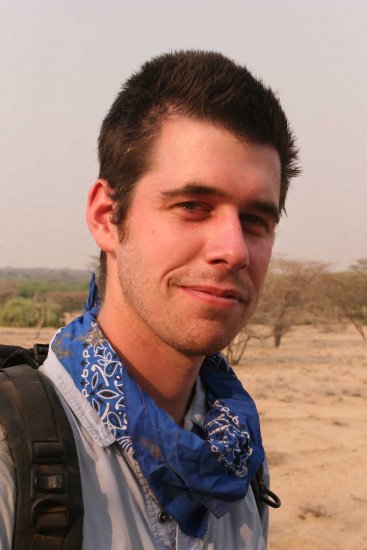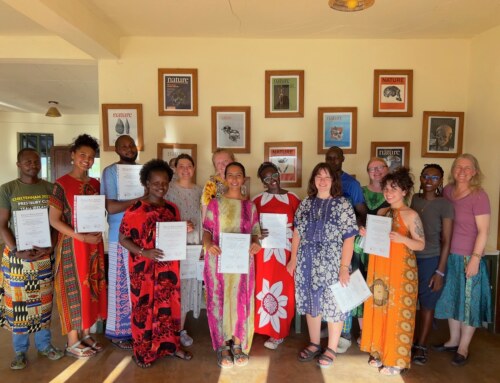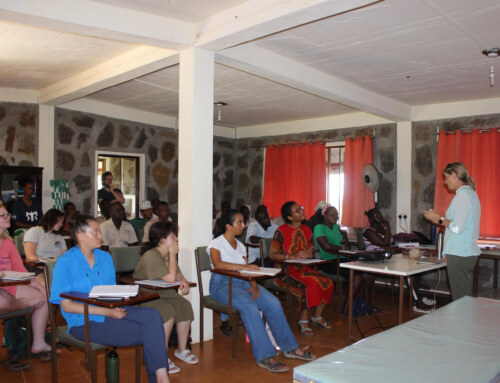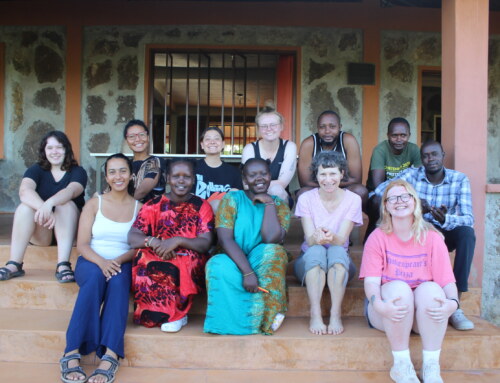The field of evolutionary biology has never advanced so quickly, nor been so integrated in modern and biomedical sciences as it is today. Nevertheless Darwin and his ideas remain controversial for some in the United States and in Kenya, and the teaching of evolution is repeatedly challenged in public schools. TBI students and staff met on Darwin’s birthday to discuss the importance of evolutionary biology in the 21st century, and ways of further promoting scientific education globally.

Luke, a student at the Turkana Basin Institute, describes the stark contrast between his scientific research and his religious background.
|
After their exam on Saturday, students gathered in the TBI mess hall to discuss human evolution and contemporary scientific research with Meave Leakey and instructors Cara Roure Johnson and Dino Martins. The topic was especially relevant, because students had just finished a course on human evolution, and it was Darwin’s 202nd birthday.
In the Autumn it will be 152 years since Darwin published his first edition of “On the Origin of Species,” a work which revolutionized biology and forever changed the way we look at the world, and our place within it.
Meave Leakey asked students, “Is public funding for evolutionary research worthwhile? Is the research itself a worthwhile endeavor?” Students reflected on the importance of evolutionary theory in modern science and philosophy, and on its conflict with religion either in their own minds or in society at large.
“I went to a private high school in Long Island,” explained Priscilla, a senior at SUNY Binghamton. “In many ways the education was considered better than at the local public schools.”
“They didn’t ever teach us about evolution, though,” she added. “In fact they told us we were created. That was in our biology class. I wouldn’t have expected something like that in the state of New York.”
Asked about her introduction to evolutionary theory, Priscilla said that she knew there were alternatives to creation from her parents. “But I had to read about evolution myself,” she said. “The subject was always fascinating to me. Unfortunately most kids at my school didn’t learn about it at all.”
Luke, an assistant entymologist working with Harvard ecologist Dino Martins, grew up in Ileret, one of the most important sites of human evolution world wide. Only two years ago a series of footprints 1.5 million years old helped show that our ancestors, Homo erectus, walked and ran upright very much like us.
And yet Luke never learned about evolution until very recently. “Our communities are very religious,” he explained, “and that is my background too. I am enjoying these courses so much, and learning a lot, but it is very hard for me because I’ve never encountered this before.”
“I want to contribute more to our discussions, to think more about evolution, and I wish I’d been able to study this previously.”
“Kenya is a very religious country,” said Mary, an Anthropologist and graduate of the University of Nairobi. “My own father is a preacher. Christian beliefs are still very important to me, and I want to answer some questions about life through my faith, not through science.”
“I also believe in evolution though. In this way, I think that science has become an important part of my faith.”
Quan, a freshman at Stony Brook and native of Vietnam, isn’t sure about his beliefs, but he wants to form them through scientific inquiry. “Religious ideas are resistant to change,” he said, “and many of them have been proven false, but people still cling to them.”
“Science shows us that we evolved, that we’re all related. And that’s why we’re all here, to learn more about the world using evidence, to learn more about where we come from.”
“Studying evolution was never a conflict for me,” said Peter, a sophomore at Binghamton. “My grandpa was an Anthropologist, and spent a lot of time in Japan. I guess my parents were never especially religious, and when I told them I was an atheist, they didn’t mind.”
“It doesn’t make any sense for me, to study human evolution and believe in God.”
“For me and for many people,” explained Julian, “evolution and religion need not be in conflict.” Julian was raised in a Christian family and now works as a Geologist at the National Museums in Nairobi. “You cannot challenge people’s beliefs,” she said, “but you can help them understand that science is another way of looking at the world.”
“Science has facts, it can be proven true, but people sometimes want to have faith and you should know how to approach them. I tell people that science and religion can be reconciled.”
“Why would you try to reconcile science with religion?” asked Patrick, a senior at Stony Brook. “I also come from a religious family, and I find religion fascinating, but why would you want to turn religion into something it’s not?”
“The people who wrote the bible had no idea of evolution,” he argued, “they were writing for a different time and context. If you try to fit science into religion, you’re misinterpreting both.”
Debbie, a senior at Stony Brook conducting research into water resources in East Africa, expressed concern over the entrance of religion into public life, including public education. “People can believe whatever they want,” she said, “but they have no right to bring religion into classrooms, and deny students their right to an education in science.”
“The United States is falling behind other industrialized countries in the teaching of basic sciences in elementary school, in high school,” she added. “Because of the entrance of religion into politics, evolution has become a controversial subject.”
“I’m a catholic,” said Sonia, “but I’m also a scientist, which means that I recognize what science has accomplished, and what it’s done for us.”
“Students need to be exposed to scientific ideas when they’re young,” she continued, “that’s only fair. That’s the only way they can make informed decisions for themselves, and that’s the only way we can guarantee a quality education in our schools.”














